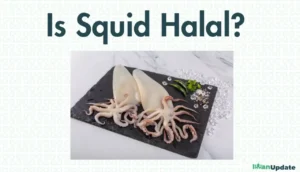Is Calamari Halal? A Complete Guide

The term calamari originates from the Italian word for “squid.” In the United States, it commonly refers to a battered and deep-fried appetizer often served in restaurants.
While many Mediterranean countries have their own versions of squid dishes, calamari is also widely enjoyed across various Asian cuisines.
Its preparation varies from simple frying to intricate recipes featuring marinades and spices, showcasing the versatility of this seafood delicacy.
Popular calamari dishes include calamari rings, calamari steaks, deep-fried calamari, and crispy calamari.
These dishes are typically accompanied by sauces like marinara or aioli, which enhance their flavor.
But what about its halal status? Is calamari considered halal or haram? This question is crucial for many Muslim diners who wish to adhere to dietary laws while enjoying this popular seafood.
Is Calamari Halal?
Yes,according to most scholars, calamari is halal in Islam. The general principle in Islamic dietary laws is that all types of sea animals are permissible to eat, making calamari acceptable to consume. This view is supported by the majority of jurists across various schools of thought, including the Sunni schools of Shafi’i, Maliki, and Hanbali.
However, certain sea animals, such as frogs and crocodiles, are explicitly prohibited (haram) due to clear restrictions outlined in Islamic teachings.
Understanding these distinctions is essential for Muslims seeking to navigate the complexities of dietary laws while enjoying a diverse array of foods.
READ ALSO: Is Squid Halal? A Complete Guide
Why Is Calamari Considered Halal?
- Divine Allowance: Calamari is halal because it is permitted by Allah and the Prophet Muhammad (peace be upon him). The Prophet stated that certain types of dead animals, including seafood like squid and octopus, are lawful to consume. This allowance underscores the inclusivity of Islamic dietary laws, providing a broad spectrum of options for believers.
- Quranic Validation: The Quran states:
“Lawful to you is game from the sea and its food as provision for you.”
Surah Al-Ma’idah: 96
This verse supports the idea that all sea animals, regardless of their status (caught by Muslims or non-Muslims, dead or alive), are halal to eat. This permissibility allows Muslims to partake in various seafood dishes, including calamari, without concern for its halal status.
- Narrations Supporting Seafood Consumption: A hadith reported by Abu Hurayrah mentions that the Prophet (peace be upon him) confirmed the purity of sea water and that its dead animals are lawful for consumption. This is a significant endorsement of seafood, including calamari, reinforcing the belief that seafood is a vital and permissible part of the Muslim diet.
- General Principle of Halal: A fundamental tenet of Islam is that all worldly things are halal unless explicitly prohibited. Since calamari is not mentioned as haram in either the Quran or Hadith, it is considered permissible to eat. This principle allows Muslims to enjoy a wide range of foods, promoting a healthy and varied diet.
- Health Considerations: While calamari is generally deemed halal, it’s important to ensure that it is sourced and prepared in a clean and healthy manner. Concerns about sustainability and health risks, such as mercury levels in certain fish, may influence personal dietary choices. Muslims are encouraged to seek fresh and responsibly sourced seafood, contributing to both their health and environmental sustainability.
Perspectives Across Islamic Schools of Thought
- Sunni Islam: The majority of Sunni scholars (Shafi’i, Hanbali, and Maliki) agree that all forms of sea life are halal, with some minor exceptions. Calamari, therefore, falls under this permissibility since it poses no harm and does not require ritual slaughter. This agreement among the schools highlights a shared understanding of the Quranic verses that permit seafood consumption.
- Hanafi View: Within the Hanafi school, the opinions are varied. Some scholars deem calamari haram, while others classify it as makrooh (discouraged). The Hanafi perspective typically allows only fish as halal, which excludes squid and other non-fish sea creatures. This nuanced view demonstrates the diversity within Islamic jurisprudence and the importance of considering different scholarly opinions.
- Shia Perspective: In Shia Islam, calamari is often regarded as haram due to similar concerns about it not being classified as a fish. This perspective emphasizes the need for individuals to be aware of their specific sect’s teachings regarding dietary laws. Understanding these distinctions can help Muslims make informed decisions about their food choices.
Can Muslims Eat Calamari?
Yes, Muslims can eat calamari, particularly if they follow the Sunni interpretation of halal dietary laws. It is essential, however, to be aware of individual beliefs and school interpretations regarding seafood.
Those who follow the Hanafi or Shia schools may wish to avoid calamari based on their understanding of its halal status.
Moreover, the manner in which calamari is prepared can also affect its halal status. If calamari is cooked alongside non-halal ingredients or in a manner that does not adhere to Islamic guidelines, its permissibility may be compromised.
Therefore, Muslims should be vigilant about the preparation methods and ingredients used in calamari dishes, especially when dining out.
Conclusion
In summary, calamari and other sea creatures like crabs and shrimp are generally considered halal across most Islamic schools of thought. However, some specific animals, such as crocodiles and frogs, are prohibited.
There is no direct evidence in the Quran or Sunnah that forbids calamari, and the concerns raised by the Hanafi school about its permissibility are often viewed as weak.
Ultimately, if scientific evidence suggests that any sea animal could be harmful to human health, it would be deemed haram, as Islam prioritizes the well-being of its followers. Always seek guidance from knowledgeable scholars if uncertain about dietary choices.
By understanding the varying perspectives on calamari and seafood consumption in Islam, Muslims can enjoy their meals while adhering to their faith.
Embracing diverse culinary traditions and ensuring compliance with halal principles enriches the dining experience and fosters a deeper appreciation for the blessings of food.






